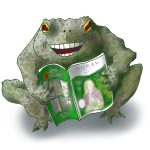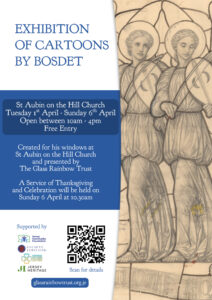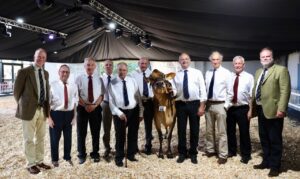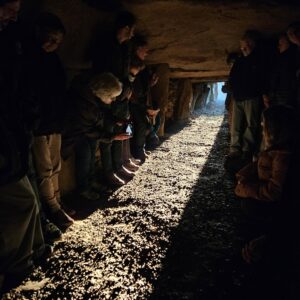
We continue our series of article in Jèrriais – Jersey’s own traditional native language. The ‘frouque’ in question is a digging fork, rather than a table fork. An English translation follows. This contribution comes from Aline Cattermole
Des mémouaithes du lockdown
Nos v’là don à la fîn du mais d’Janvyi, tout pliein d’espé tandi qué l’ vaccîn tchi s’en va, nou dit, nos protégi contre la Covid, c’menche à êt’ înjecté ès habitants d’l’île. D’abord, ch’t’ Hivé, ès pus anciens et fragiles. Et pis, duthant l’Èrnouvé au reste des habitants. Ch’est-i’ qu’i faudra vaccîner les mousses étout? Pouor achteu, nou n’sait pon. J’crai même qu’les docteurs né s’accordent pas sus la tchestchion.
Eune chose est seûthe: l’espé est grand entouor lé vaccîn. J’espéthons èrtouônner à not’ vie dé d’vant, bein embârrassée auve lé travas, l’s activités, les rêunions auve la fanmil’ye et l’s anmîn, les viages, et la boutiqu’sie en Ville. Eune vie en touôgnêthie, ou comme disait la chant’rêsse Française Edith Piaf “le tourbillon de la vie”
Mais, pouor châtchun d’nous, tch’est qu’i’ restetha dé chu “lockdown”? Tch’est qu’i restetha dé chutte pause împosée dans nos vies? La tchestchion est pèrsonnelle et la rêponse est probabliément difféthente pouor châtchun d’nous.
En touos cas, lé “lockdown” fut pouor tout l’monde l’occâsion d’arrêter ses activités normales ou d’les faithe difféthement. Cèrtains fîtent sèrvi chutte pause pouor èrfliéchi entouor lus vie, d’aut’ c’menchitent d’s activités siez ieux tchi n’avaient janmais ieu l’temps faithe dévant ch’na.
Pouor mé, lé “lockdown” a ‘té l’occâsion dé pâsser pus d’temps auve man fis tch’ a trais ans et j’ai hardi joui d’ches moments! J’trouvînmes eune activité qu’j’aimons bein faithe les deux d’nous quand j’sommes siez nous: la gâchin’nie! J’dis gâchin’nie mais en réalité ch’est graie toute sortes dé gâches, dé podîns et d’chucrin’nie! J’griyînmes des gâches auve toutes sortes dé frits: pommes, paithes, bananes, j’griyînmes des galettes, des pains d’êpices, des mousses dé chocolat, des dattes fouôrrées auve dé la pâte d’amande et tout pliein d’aut’ fricots.
I fallit explyitchi calmément à man fis qu’nou fait sèrvi la rouôlette à pâte pour êtaler la pâte et pon pouor taper les gens, comme i’ criyait lé p’tit malîn, et qu’i’ faut mett’ la flieu dans la bolle et pon dans l’aithe “pouor faithe tchaie d’la né” comme i’ m dit! J’sis heutheuse d’aver pu pâsser du temps auve man fis duthant lé “lockdown”, ch’ tait du fourbi mais ch’ ‘tait hardi du fanne étout.
Eune aut’chose qué j’fis duthant lé “lockdown” ch’est man bouais d’fanmil’ye. J’avais tréjous ieu l’idée dé l’faithe mais j’n’avais jamais ieu l’temps. Et bein, v’là qué ch’tait l’occâsion. Et jé n’èrgrette pon! J’dêcouvris un tas d’tchi entouor mes anchêtres et l’histouaithe dé ma fanmil’ye. Ches dêcourvèrtes fûtent surprannantes, et hardi hardi êmouvantes! J’savais qu’mes originnes ‘taient mêlées mais pon autant!
D’vant d’faithe man bouais, j’savais déjà un mio entouor mes pathents et mes grand-pathents mais jé n’savais quâsiment rein entouor les généthâtions dé d’vant.
J’savais qu’man péthe fut né à Falaise en Nouormandie, comme mé, d’eune méthe Nouormande et d’un péthe Italien du Piedmont, eune région au Nord dé l’Italie. J’savais qu’ma méthe fut née en Algérie Française d’eune méthe Italienne dé la Sardaigne et d’un péthe Français d’originne Espangnole.
Et bein, eune chose încriyabl’ye est qu’eune grand’ part dé mes anchêtres d’meuthaient dans d’s îles! L’s Espangnos ‘taient d’Menorca ès îles Baléares, les Italiens ‘taient dé Gozo à côté d’Malte et d’ l’île dé Saint Pièrre en Sardaigne! I’ pâlaient tous la langue dé lus île en pus d’l’Italien et d’l’Espangno. I’ tchittitent tous lus île pouor chèrchi du travas et pouor offri un av’nîn miyeu à lus êfants.
Jé n’savais pas tout ch’na. Tchi surprînse! La chose amusante est qué tchiques généthâtions pus tard, j’ èrtouônnis à vivre dans eune île: Jèrri. Et j’ensîngne la langue dé ch’t’ île! Y’a cèrtainement un écho entre lus vie et la meinne!
……………………………………………………………………………………………………………
Memories from lockdown
Here we are, at the end of January, full of hope while the vaccine, which is going to protect us from Covid, starts to be injected into people within the Island. First, during this winter, to old and vulnerable people. Then, during Spring time, to the rest of the population. Will it be necessary to vaccinate children as well? For now, we don’t know. I believe doctors do not even agree about that question.
One thing is sure: hope is great about the vaccine. We hope to return to our prior life, busy with work, activities, gathering with family and friends, travels and shopping in town. A whirling life or, like Edith Piaf the French singer would say: ‘the whirlwind of life’.
But, for each of us, what will be left from this lockdown? What will be left from this imposed pause in our lives? The question is personal and the answer is probably different for each of us.
In any case, the lockdown was for all the opportunity to stop our normal activities or to conduct them in a different way. Some used this moment to reflect upon their life. Others started new activities from home, which they never found the time to do before.
For me, the lockdown was the opportunity to spend more time with my three-year-old son and I have really enjoyed these moments. We found an activity we really enjoy doing together, when we are at home: baking. I say ‘baking’, but in reality it is about making all sorts of cakes, puddings, and sweet treats. We made cakes with all sorts of fruits including apples, pears and bananas. We made biscuits, ginger breads, chocolate mousse, dates filled with marzipan and many other delicacies.
I had to calmly explain to my son that a rolling-pin is to roll out the dough (and not to hit people with!) and that we need to put the flour in a bowl and not on the floor ‘to make it snow’, like he said. I’m happy I could spend more time with my son. It was messy but it was a lot of fun.
Another thing I did during the lockdown is my family tree. I had always the idea of doing it but I had never found the time. Well, that was the opportunity. And I don’t regret it. I discovered a lot about my ancestors and my family history. Those discoveries were surprising but above all very emotional. I knew that my origins were mixed. But not that much!
Before doing a family tree, I already knew a bit about my parents and grand-parents history but I didn’t know much about the prior generations. I knew my dad was born in Falaise, Normandy (like me) from a Norman mother and an Italian father (from the Piedmont region in the North of Italy). I knew my mum was born in French Algeria from an Italian mother (from Sardinia) and from a French father with Spanish origins.
Well, something incredible I found is that a large part of my ancestors used to live in islands. The Spanish were from Menorca in the Balearic Islands. The Italians were from Gozo, the island next to Malta, and from San Peter Island (Isola di San Pietro) in Sardinia. They used to speak the language of their islands in addition to Spanish and Italian. They all left their island to look for work and to offer a better future to their children.
I didn’t know all of that. What a surprise! The funny thing is that a few generations later, I came back to live on an island: Jersey. And I teach the language of this island. There is certainly an echo between their lives and mine!
EUNE FROUQU’THÉE D’JÈRRIAIS – (A FORKFUL OF JÈRRIAIS)
We continue our series of article in Jèrriais – Jersey’s own traditional native language. The ‘frouque’ in question is a digging fork, rather than a table fork. An English translation follows. This contribution comes from Aline Cattermole
Des mémouaithes du lockdown
Nos v’là don à la fîn du mais d’Janvyi, tout pliein d’espé tandi qué l’ vaccîn tchi s’en va, nou dit, nos protégi contre la Covid, c’menche à êt’ înjecté ès habitants d’l’île. D’abord, ch’t’ Hivé, ès pus anciens et fragiles. Et pis, duthant l’Èrnouvé au reste des habitants. Ch’est-i’ qu’i faudra vaccîner les mousses étout? Pouor achteu, nou n’sait pon. J’crai même qu’les docteurs né s’accordent pas sus la tchestchion.
Eune chose est seûthe: l’espé est grand entouor lé vaccîn. J’espéthons èrtouônner à not’ vie dé d’vant, bein embârrassée auve lé travas, l’s activités, les rêunions auve la fanmil’ye et l’s anmîn, les viages, et la boutiqu’sie en Ville. Eune vie en touôgnêthie, ou comme disait la chant’rêsse Française Edith Piaf “le tourbillon de la vie”
Mais, pouor châtchun d’nous, tch’est qu’i’ restetha dé chu “lockdown”? Tch’est qu’i restetha dé chutte pause împosée dans nos vies? La tchestchion est pèrsonnelle et la rêponse est probabliément difféthente pouor châtchun d’nous.
En touos cas, lé “lockdown” fut pouor tout l’monde l’occâsion d’arrêter ses activités normales ou d’les faithe difféthement. Cèrtains fîtent sèrvi chutte pause pouor èrfliéchi entouor lus vie, d’aut’ c’menchitent d’s activités siez ieux tchi n’avaient janmais ieu l’temps faithe dévant ch’na.
Pouor mé, lé “lockdown” a ‘té l’occâsion dé pâsser pus d’temps auve man fis tch’ a trais ans et j’ai hardi joui d’ches moments! J’trouvînmes eune activité qu’j’aimons bein faithe les deux d’nous quand j’sommes siez nous: la gâchin’nie! J’dis gâchin’nie mais en réalité ch’est graie toute sortes dé gâches, dé podîns et d’chucrin’nie! J’griyînmes des gâches auve toutes sortes dé frits: pommes, paithes, bananes, j’griyînmes des galettes, des pains d’êpices, des mousses dé chocolat, des dattes fouôrrées auve dé la pâte d’amande et tout pliein d’aut’ fricots.
I fallit explyitchi calmément à man fis qu’nou fait sèrvi la rouôlette à pâte pour êtaler la pâte et pon pouor taper les gens, comme i’ criyait lé p’tit malîn, et qu’i’ faut mett’ la flieu dans la bolle et pon dans l’aithe “pouor faithe tchaie d’la né” comme i’ m dit! J’sis heutheuse d’aver pu pâsser du temps auve man fis duthant lé “lockdown”, ch’ tait du fourbi mais ch’ ‘tait hardi du fanne étout.
Eune aut’chose qué j’fis duthant lé “lockdown” ch’est man bouais d’fanmil’ye. J’avais tréjous ieu l’idée dé l’faithe mais j’n’avais jamais ieu l’temps. Et bein, v’là qué ch’tait l’occâsion. Et jé n’èrgrette pon! J’dêcouvris un tas d’tchi entouor mes anchêtres et l’histouaithe dé ma fanmil’ye. Ches dêcourvèrtes fûtent surprannantes, et hardi hardi êmouvantes! J’savais qu’mes originnes ‘taient mêlées mais pon autant!
D’vant d’faithe man bouais, j’savais déjà un mio entouor mes pathents et mes grand-pathents mais jé n’savais quâsiment rein entouor les généthâtions dé d’vant.
J’savais qu’man péthe fut né à Falaise en Nouormandie, comme mé, d’eune méthe Nouormande et d’un péthe Italien du Piedmont, eune région au Nord dé l’Italie. J’savais qu’ma méthe fut née en Algérie Française d’eune méthe Italienne dé la Sardaigne et d’un péthe Français d’originne Espangnole.
Et bein, eune chose încriyabl’ye est qu’eune grand’ part dé mes anchêtres d’meuthaient dans d’s îles! L’s Espangnos ‘taient d’Menorca ès îles Baléares, les Italiens ‘taient dé Gozo à côté d’Malte et d’ l’île dé Saint Pièrre en Sardaigne! I’ pâlaient tous la langue dé lus île en pus d’l’Italien et d’l’Espangno. I’ tchittitent tous lus île pouor chèrchi du travas et pouor offri un av’nîn miyeu à lus êfants.
Jé n’savais pas tout ch’na. Tchi surprînse! La chose amusante est qué tchiques généthâtions pus tard, j’ èrtouônnis à vivre dans eune île: Jèrri. Et j’ensîngne la langue dé ch’t’ île! Y’a cèrtainement un écho entre lus vie et la meinne!
……………………………………………………………………………………………………………
Memories from lockdown
Here we are, at the end of January, full of hope while the vaccine, which is going to protect us from Covid, starts to be injected into people within the Island. First, during this winter, to old and vulnerable people. Then, during Spring time, to the rest of the population. Will it be necessary to vaccinate children as well? For now, we don’t know. I believe doctors do not even agree about that question.
One thing is sure: hope is great about the vaccine. We hope to return to our prior life, busy with work, activities, gathering with family and friends, travels and shopping in town. A whirling life or, like Edith Piaf the French singer would say: ‘the whirlwind of life’.
But, for each of us, what will be left from this lockdown? What will be left from this imposed pause in our lives? The question is personal and the answer is probably different for each of us.
In any case, the lockdown was for all the opportunity to stop our normal activities or to conduct them in a different way. Some used this moment to reflect upon their life. Others started new activities from home, which they never found the time to do before.
For me, the lockdown was the opportunity to spend more time with my three-year-old son and I have really enjoyed these moments. We found an activity we really enjoy doing together, when we are at home: baking. I say ‘baking’, but in reality it is about making all sorts of cakes, puddings, and sweet treats. We made cakes with all sorts of fruits including apples, pears and bananas. We made biscuits, ginger breads, chocolate mousse, dates filled with marzipan and many other delicacies.
I had to calmly explain to my son that a rolling-pin is to roll out the dough (and not to hit people with!) and that we need to put the flour in a bowl and not on the floor ‘to make it snow’, like he said. I’m happy I could spend more time with my son. It was messy but it was a lot of fun.
Another thing I did during the lockdown is my family tree. I had always the idea of doing it but I had never found the time. Well, that was the opportunity. And I don’t regret it. I discovered a lot about my ancestors and my family history. Those discoveries were surprising but above all very emotional. I knew that my origins were mixed. But not that much!
Before doing a family tree, I already knew a bit about my parents and grand-parents history but I didn’t know much about the prior generations. I knew my dad was born in Falaise, Normandy (like me) from a Norman mother and an Italian father (from the Piedmont region in the North of Italy). I knew my mum was born in French Algeria from an Italian mother (from Sardinia) and from a French father with Spanish origins.
Well, something incredible I found is that a large part of my ancestors used to live in islands. The Spanish were from Menorca in the Balearic Islands. The Italians were from Gozo, the island next to Malta, and from San Peter Island (Isola di San Pietro) in Sardinia. They used to speak the language of their islands in addition to Spanish and Italian. They all left their island to look for work and to offer a better future to their children.
I didn’t know all of that. What a surprise! The funny thing is that a few generations later, I came back to live on an island: Jersey. And I teach the language of this island. There is certainly an echo between their lives and mine!




